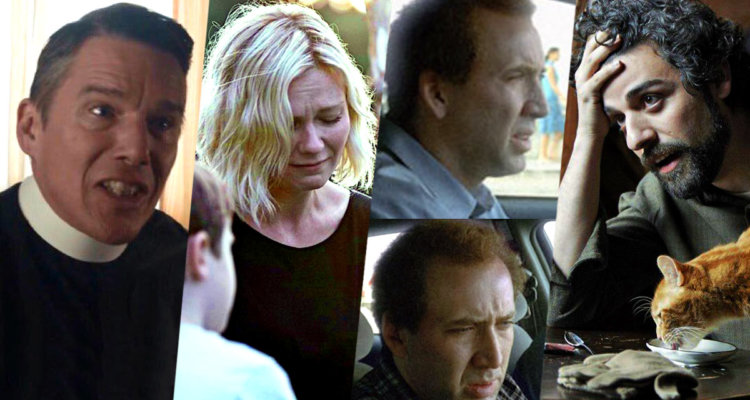“A Man Escaped”
French filmmaker Robert Bresson walked, so most of the directors on this list could run. The man who gave us half of a century’s worth of existential despair could practically fill this list with most of his filmography (“L’argent” and “Mouchette” were in the running), but it’s impossible to deny the power and influence of his 1956 drama “A Man Escaped.” Based on the memoirs of French Resistance fighter André Devigny, Bresson’s film is not only a masterclass in economic filmmaking where every frame matters, but a timely reminder of what an actual Resistance against fascism looks like (hint: it’s not the Twitter Resistance that seems to think the world’s problems begin and end with Trump). Instead of the narrative sprawl found in American filmmakers’ prison escape dramas, Bresson boils his plot down to the essentials. The meticulous framing, revelatory sound design, haunting lead performance, and ace editing provide the film with its essential cinematic thrills, but it’s Bresson’s complex psychological understanding of imprisonment and resistance that make the film a timeless classic. – MR
“Melancholia”
Lars von Trier might not always make it easy for us to like him, but when you experience a film as devastating and unforgettable as “Melancholia,” you’re reminded of his unparalleled power as a filmmaker. Quite possibly the most disturbingly accurate depiction of depression ever put on screen, Von Trier’s marriage (sorry) of mental illness and the apocalypse feels even more frighteningly relevant than ever right now. As the world descends further into chaos and division, the so-called “sane” members of society have come undone and are predictably lashing out, while those who have long suffered with mental illness and depression might feel something approaching tranquility. Von Trier uses the sisters at the center of the film (Kirsten Dunst and Charlotte Gainsbourg) to represent society’s differing perspectives of end-times, and our current moment couldn’t feel more similar. In the face of the apocalypse, Justine finds peace in the end, telling her sister, “The earth is evil—we don’t need to grieve for it.” She knows the unforgivable acts of evil humans have perpetrated in their time on this planet, but she also sees hope in the destruction. It’s the end of the world, and this is the only thing that can truly bring us together. – MR
“Morvern Callar”
While it’s tough to assert that each Lynne Ramsay movie is explicitly about existential despair, it feels safe to say each of her four films to date explores trauma in one way or another. In “We Need To Talk About Kevin,” it’s the trauma of a parent realizing their child may be a sociopath, in “You Were Never Really Here,” it’s how a traumatic childhood can manifest a violent adulthood. “Morvern Callar” is Ramsay’s examination of how a young woman grapples with her boyfriend’s suicide, and it’s one of her most disorienting and affecting works. Ramsay understands how grief shatters the inherent linearity of our lives, and how part of our ongoing human struggle means putting the pieces of ourselves back together in the wake of tragedy. It certainly doesn’t hurt that Samantha Morton, who is never anything less than emotionally open onscreen, gives one of her rawest turns to date in Ramsay’s shattering examination of desolation. – NL
“La Notte”
The cultural influence of Antonioni’s “La Notte” is almost too immense to quantify: you can see traces of its sensuous upper-crust anguish in everything from “Mad Men” (Don Draper himself is a fan) to 2019’s “Marriage Story.” Like Noah Baumbach’s critically lauded study of divorce, “La Notte” is about a disenchanted couple who come to realize that they know each other so much less than they think they do. The fact that the couple in question are played by two beautiful, charismatic staples of Italian cinema, Monica Vitti and Marcello Mastroianni, only adds to the movie’s appeal. While “La Notte” is very much a film about despair, it’s also a fearless study of how two people can lose their respective identities if they find themselves trapped in a frigid, static emotional union. “La Notte” is a masterwork of joyless parties, innuendos, and champagne problems: in other words, it’s a quintessentially Michelangelo Antonioni experience. – NL
“Pain and Glory”
Each Pedro Almodóvar film offers its own singular set of virtues, and “Pain and Glory,” which oscillates between being wistful, sensual, and crushing, is no different. The film is a masterful jumble of time and memory, recalling pastoral passages from the director’s childhood, a lamentation over his misunderstood work, and severed relationships with those whom he may have alienated along the way. Almodóvar has, in the past, been known for his visual buoyancy: there’s an in-your-face quality to the colors, the outré attitudes, and the overwhelming queerness of his worldview that can be intoxicating. All those qualities are accounted for in “Pain and Glory,” but they are tempered without being flattened. This is the work of a more mature artist that’s also a poignant meditation on our bodies and minds failing us. It’s a film that understands that the only thing that matters, at the end of the day, is our relationship with our loved ones, and the legacy we leave behind. – NL

